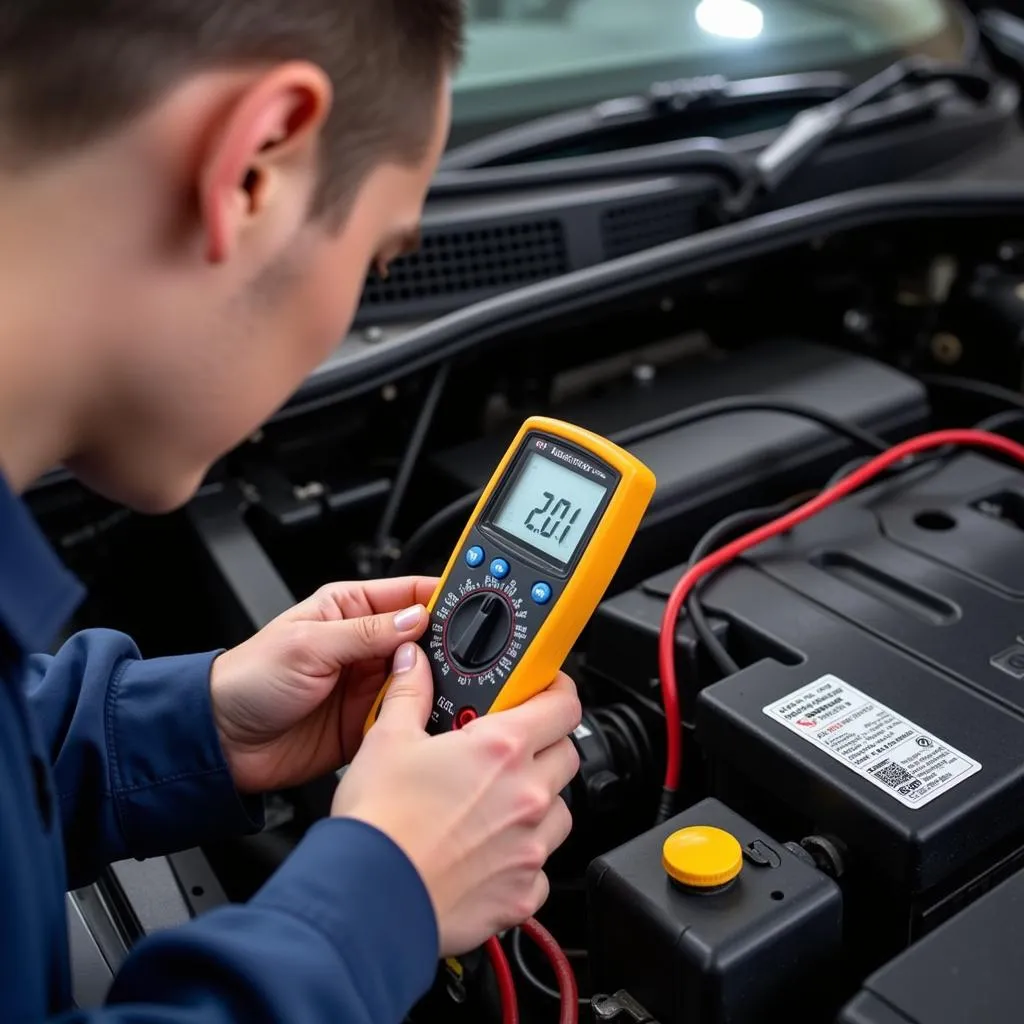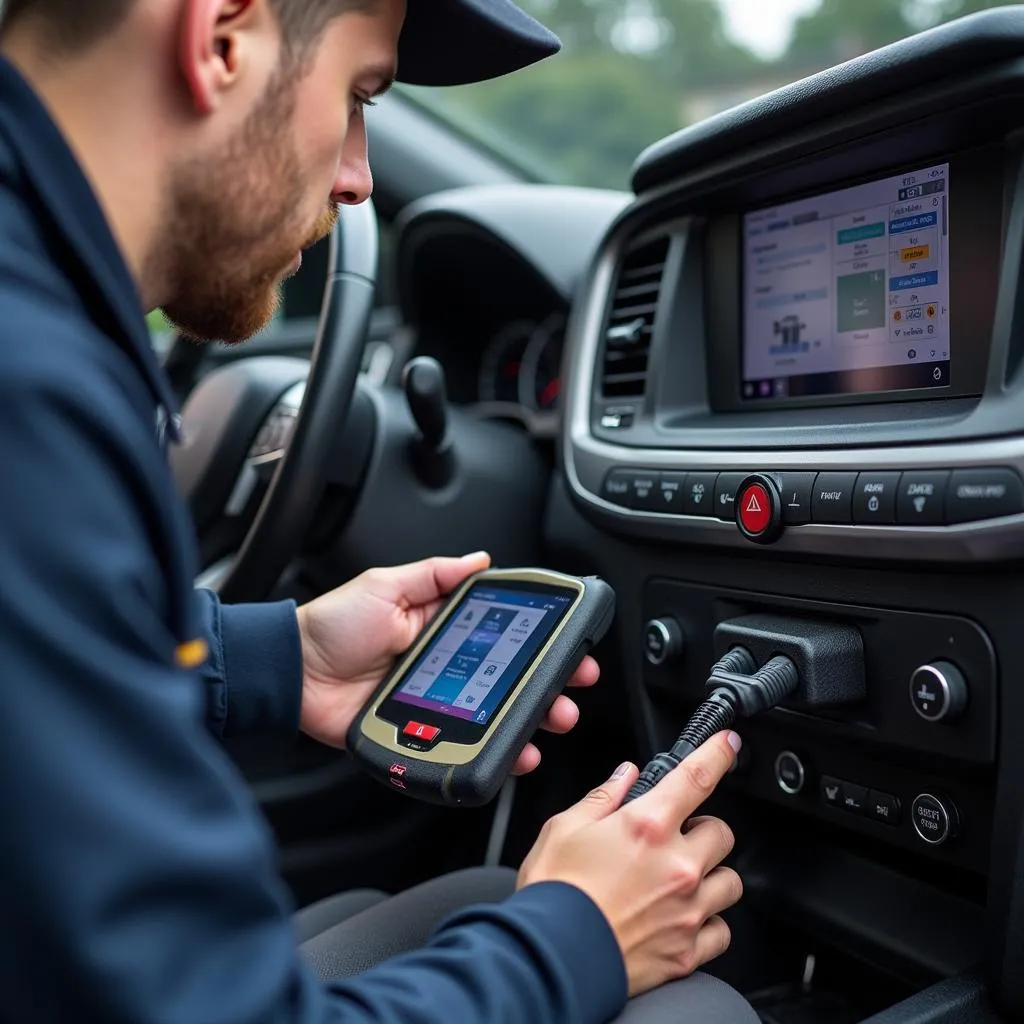A weak start, where your car struggles to turn over before finally catching, can be a frustrating and concerning experience. This issue can stem from various factors, ranging from a drained battery to a faulty fuel pump. This article will delve into the common causes of a weak start and provide comprehensive solutions to get your car running smoothly again.
 Car battery voltage test
Car battery voltage test
Common Causes of a Weak Start
Before jumping to conclusions, it’s essential to understand the potential culprits behind your car’s weak start. Here are some of the most prevalent causes:
1. Weak or Dying Battery
The battery is often the first suspect when your car struggles to start. A weak battery may not provide enough power to crank the engine efficiently, resulting in a sluggish start.
Signs of a Weak Battery:
- Slow cranking speed
- Dim headlights and interior lights
- Clicking sound when turning the key
- Older battery (over 3-5 years)
2. Faulty Starter Motor
The starter motor is responsible for turning the engine over and initiating the combustion process. A failing starter motor might draw excessive current, leaving insufficient power for a strong start.
Signs of a Faulty Starter Motor:
- Grinding noise when starting
- Intermittent starting issues
- Starter motor remains engaged after the engine starts
3. Fuel System Issues
Problems within the fuel system can also contribute to weak starts. Insufficient fuel pressure or a clogged fuel filter can hinder the delivery of fuel to the engine, leading to starting difficulties.
Signs of Fuel System Issues:
- Engine sputtering or stalling
- Difficulty starting after refueling
- Decreased fuel efficiency
4. Ignition System Problems
The ignition system provides the spark necessary to ignite the air-fuel mixture in the cylinders. Worn-out spark plugs, faulty ignition coils, or a malfunctioning crankshaft position sensor can disrupt this process, causing a weak start.
Signs of Ignition System Problems:
- Engine misfires
- Rough idling
- Illuminated check engine light
5. Other Potential Causes
While less common, other factors can contribute to a weak start, including:
- Thick engine oil: Cold weather can thicken engine oil, making it harder for the starter to turn the engine.
- Vacuum leaks: Leaks in the intake manifold can disrupt the air-fuel mixture, affecting starting.
- Faulty alternator: A malfunctioning alternator may not adequately recharge the battery, leading to a weak start over time.
 Mechanic inspecting a car engine
Mechanic inspecting a car engine
Troubleshooting a Weak Start
If you’re experiencing a weak start, here’s a step-by-step guide to help you troubleshoot the issue:
1. Check the Battery
- Inspect the battery terminals: Ensure they are clean, tight, and free of corrosion.
- Test the battery voltage: Use a multimeter to check the battery’s charge. A fully charged battery should read around 12.6 volts.
If you suspect a weak battery, try jump-starting your car. If it starts successfully, consider having your battery tested or replaced.
2. Listen for Unusual Sounds
Pay close attention to any unusual noises when attempting to start your car. Grinding sounds could indicate a faulty starter motor, while clicking noises might point to a battery problem.
3. Inspect the Fuel System
- Check the fuel gauge: Ensure you have enough fuel in the tank.
- Listen for the fuel pump: Turn the ignition key to the “on” position (without starting the engine) and listen for a humming sound from the fuel pump.
If you suspect a fuel system issue, it’s best to consult a qualified mechanic for diagnosis and repair.
4. Examine the Ignition System
- Inspect the spark plugs: Remove and examine the spark plugs for wear and tear.
- Check for damaged ignition coils: Look for any cracks or damage to the ignition coils.
If you’re comfortable working with car components, you can attempt to replace worn-out spark plugs. However, it’s advisable to seek professional help for complex ignition system repairs.
When to Seek Professional Help
While some weak start causes can be addressed with basic troubleshooting, it’s crucial to seek professional assistance if:
- You’re uncomfortable working on your car.
- The problem persists after trying basic troubleshooting steps.
- You suspect a complex issue with the starter motor, fuel system, or ignition system.
A qualified mechanic can accurately diagnose the root cause of the weak start and recommend the appropriate repairs.
 Car diagnostic equipment connected to a vehicle
Car diagnostic equipment connected to a vehicle
Preventing Weak Starts
Regular car maintenance can significantly reduce the likelihood of encountering a weak start. Here are some preventive measures:
- Battery maintenance: Clean the battery terminals regularly and have the battery tested annually, especially as it ages.
- Fuel system care: Use good quality fuel and consider using fuel system cleaners periodically.
- Regular tune-ups: Follow your car’s recommended maintenance schedule for spark plug replacements, oil changes, and other essential services.
- Address starting issues promptly: Don’t ignore persistent starting problems, as they might indicate a more serious underlying issue.
Conclusion
A car that has a weak start can be a sign of various issues, from a simple battery problem to a more complex fuel system malfunction. By understanding the common causes, following the troubleshooting steps, and seeking professional help when needed, you can overcome this frustrating issue and get back on the road with confidence. Remember, preventative maintenance and addressing starting problems promptly can go a long way in ensuring your car starts reliably every time.
FAQs
Q: How long should a car battery last?
A: Car batteries typically last between 3 to 5 years, but their lifespan can vary depending on factors like climate and driving habits.
Q: Can a bad alternator cause a weak start?
A: Yes, a failing alternator may not charge the battery properly, leading to a weak start over time.
Q: Can I drive my car with a weak start?
A: While you might be able to drive for a short distance with a weak start, it’s not advisable. Continuing to drive could worsen the underlying issue and potentially leave you stranded.
Q: How much does it cost to replace a starter motor?
A: The cost of replacing a starter motor can vary depending on the make and model of your car. Typically, you can expect to pay between $300 to $800 for parts and labor.
Q: How can I improve my car’s starting performance?
A: Regular maintenance, including battery care, fuel system cleaning, and timely tune-ups, can significantly improve your car’s starting performance.
Still have questions?
If you need further assistance or have more questions regarding car turns over and then dies or sensitive face skin care, feel free to explore our other informative articles.
Need help with your car?
Contact our expert team via WhatsApp: +1(641)206-8880, Email: [email protected], or visit us at 276 Reock St, City of Orange, NJ 07050, United States. We’re available 24/7 to assist you with all your car care needs.
